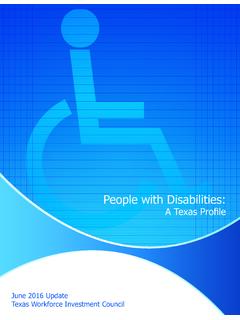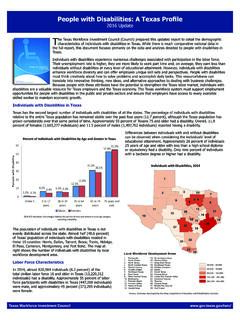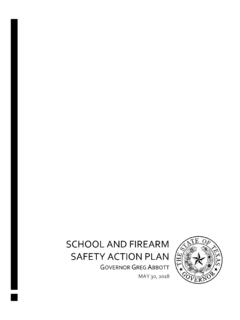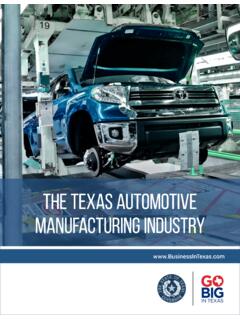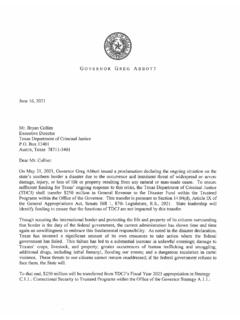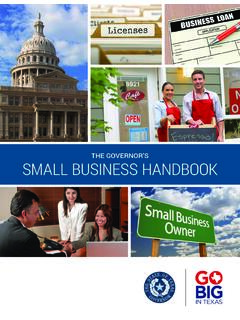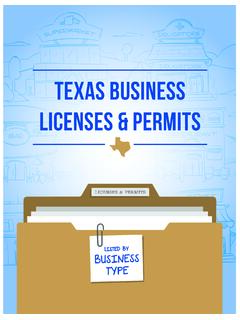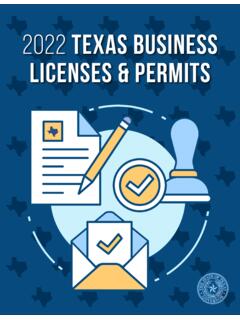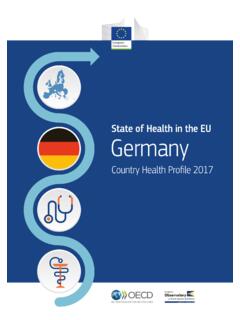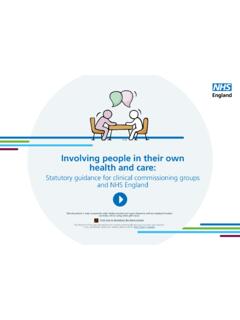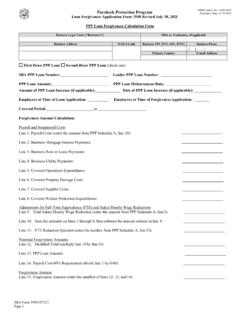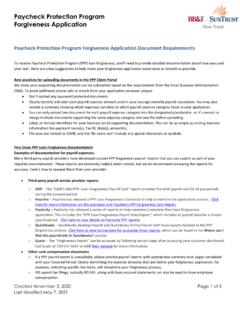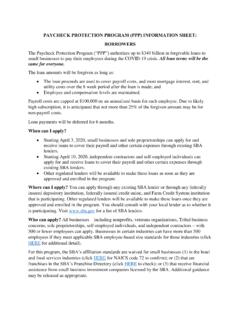Transcription of CARES ACT - Greg Abbott
1 CARES ACT The Coronavirus Aid, Relief, and Economic Security ( CARES ) Act was passed by Congress on March 27, 2020. The programs and initiatives in the Act are intended to assist business owners and nonprofits with current needs due to the COVID-19 crisis. Following President Trump s signing of the CARES Act, the Small Business Administration (SBA) and the Department of Treasury announced a robust mobilization effort of banks and other lending institutions to provide small businesses with the capital they need. The CARES Act establishes a new $349 billion Paycheck Protection Program. The Program will provide much-needed relief to millions of small businesses so they can sustain their businesses and keep their workers employed. The Act designates $ billion to remain available until September 30, 2022, to support economic development grants for states and communities suffering economic injury as a result of the coronavirus.
2 The Act designates $50 million to be distributed among the 51 Manufacturing Extension Partnership centers to help small-and medium-sized manufacturers recover from the economic impacts of coronavirus. The bill also waives the statutory cost-match requirements for all FY2020 funding. PAYCHECK PROTECTION PROGRAM Overview: The Paycheck Protection Program (PPP) is specifically designed to help small businesses keep their workforce employed and assist with payroll and other business operating expenses. It will provide critical capital to businesses without collateral requirements, personal guarantees, or SBA fees. All loan payments will be deferred for six months. Most importantly, if employers maintain their payroll, certain portions of the loans can be forgiven, including payroll, interest on mortgage obligations, rent and utility payments. Details: PPP provides cash-flow assistance through 100% federally guaranteed loans to employers who maintain their payroll during this emergency.
3 Loans are available through June 30, 2020. If employers maintain their payroll, they must apply through their lender for forgiveness on the loan. PPP has maximum deferrals of up to a year. Small businesses and other eligible entities will be able to apply if they were harmed by COVID-19 between February 15, 2020 and June 30, 2020. This program is retroactive to February 15, 2020, in order to help bring workers who may have already been laid off back onto payrolls. For any amounts not forgiven, the maximum term is 2 years, the maximum interest rate is 1%, zero loan fees, zero prepayment fee (SBA will establish application fees caps for lenders that charge). Loans will be available through existing SBA-certified lenders in Texas, including banks, credit unions and other financial institutions. Businesses can find a local lender by contacting their local Small Business Development Center, or by visiting the SBA s new lender search portal.
4 The SBA will continue to add new lenders to this tool. Some banks will be ready to begin accepting applications starting April 3, 2020. To prepare for when your bank is ready to accept applications, the Department of the Treasury has published some more information for small businesses here, and a fact sheet here. The Treasury also published an application form here, that businesses can review for insight into the type of information needed to apply, however, banks may also have their own applications. Borrowers may apply for PPP loans as well as other SBA financial assistance, including Economic Injury Disaster Loans (EIDLs), 7(a) loans, 504 loans, and microloans, and also receive investment capital from Small Business Investment Corporations (SBICs). However, businesses cannot use a PPP loan for the same purpose as other SBA loan(s). Types of businesses and entities eligible for a PPP: o Businesses and entities must have been in operation on February 15, 2020.
5 O Small business concerns, as well as any business concern, a 501(c)(3) nonprofit organization, a 501(c)(19) veterans organization, or Tribal business concern described in section 31(b)(2)(C) that has fewer than 500 employees, or the applicable size standard in number of employees for the North American Industry Classification System (NAICS) industry as provided by SBA, if higher. o Individuals who operate a sole proprietorship or as an independent contractor and eligible self-employed individuals. o Any business concern that employs not more than 500 employees per physical location of the business concern and that is assigned a NAICS code beginning with 72, for which the affiliation rules are waived. More information on PPP can be found at To find out costs eligible for payroll, allowable uses of loan proceeds and other loan details, businesses can download the Treasury s PPP Information Sheet.
6 OTHER MAJOR SMALL BUSINESS PROVISIONS IN CARES ACT Economic Injury Disaster Loan Advance - Due to the CARES Act, small businesses and non-profits can get up to a $10,000 advance on an EIDL even if a previous application was declined or still pending. The advance can be granted within three business days of applying and does not need to be repaid under any circumstance. For more information, eligibly requirements and application instructions, visit the SBA s website. Small Business Debt Relief Program - This program provides immediate relief to small businesses with non-disaster SBA loans, in particular 7(a), 504, and microloans. Under it, SBA will cover all loan payments on these SBA loans, including principal, interest, and fees, for six months. This relief will also be available to new borrowers who take out loans within six months of the President signing the bill into law.
7 Employee Retention Credit for Employers Subject to Closure or Experiencing Economic Hardship - This provision provides a refundable payroll tax credit for 50% of wages paid by eligible employers to certain employees during the COVID-19 crisis. The credit is available to: employers, including non-profits, whose operations have been fully or partially suspended as a result of a government order limiting commerce, travel or group meetings employers who have experienced a greater than 50% reduction in quarterly receipts, measured on a year-over-year basis Eligible wages include: wages of employees who are furloughed or face reduced hours as a result of their employer s closure or economic hardship are eligible for the credit. for employers with 100 or fewer full- time employees, all employee wages are eligible, regardless of whether an employee is furloughed The credit is provided for wages and compensation, including health benefits, and is provided for the first $10,000 in wages and compensation paid by the employer to an eligible employee.
8 The credit is not provided to employers receiving assistance through PPP. Delay of Payment of Employer Payroll Taxes - This provision allows taxpayers to defer paying the employer portion of certain payroll taxes through the end of 2020, with all 2020 deferred amounts due in two equal installments, one at the end of 2021, the other at the end of 2022. Payroll taxes that can be deferred include the employer portion of FICA taxes, the employer and employee representative portion of Railroad Retirement taxes (that are attributable to the employer FICA rate), and half of SECA tax liability. Deferral is not provided to employers receiving assistance through PPP. Small Business Counseling - The CARES Act includes $265 million for counseling, training, and related assistance to small businesses affected by COVID-19 through grants to SBA resource partners, including Small Business Development Centers and Women's Business Centers, and includes $10 million for the Minority Business Development Agency to provide these services through Minority Business Centers and Minority Chambers of Commerce.
9 To locate a resource center near you, click here, and to find a Minority Business Development Agency near you, click here. Bankruptcy Relief - The Act provides bankruptcy relief for small businesses by raising the maximum debt threshold for eligibility to $ million and excluding coronavirus-related payments from the federal government from income for purposes of filing bankruptcy. Small Business Tax Assistance The Act allows employers and self-employed to defer payment of the employer share of the Social Security tax with half the amount required to be paid by December 31, 2021 and the other half by December 31, 2022, if they choose not to utilize PPP. The Act temporarily increases the amount of business interest expense businesses may deduct on their tax returns from 30% to 50% of taxable income for 2019 and 2020. The Act fixes the tax code to allow Qualified Improvement Property (QIP) eligibility for 100% bonus depreciation to allow small businesses to reasonably deduct major spending for improvements made to existing property.
10 Updated April 6, 2020
